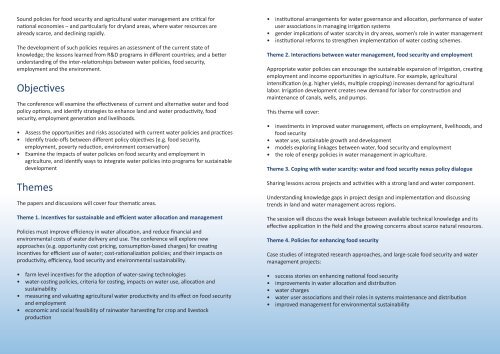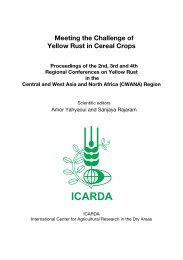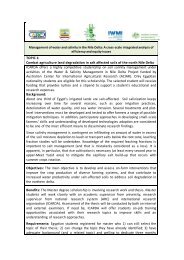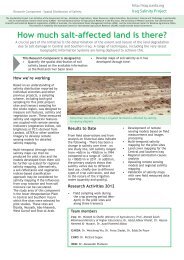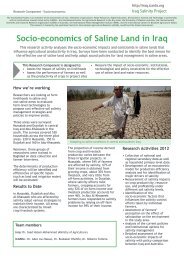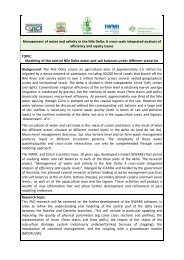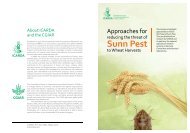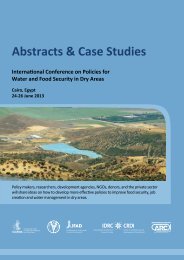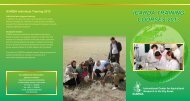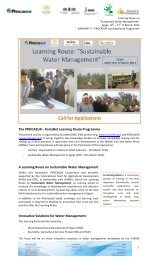Water and Food Security Conference Brochure - ICARDA
Water and Food Security Conference Brochure - ICARDA
Water and Food Security Conference Brochure - ICARDA
You also want an ePaper? Increase the reach of your titles
YUMPU automatically turns print PDFs into web optimized ePapers that Google loves.
Sound policies for food security <strong>and</strong> agricultural water management are critical for<br />
national economies – <strong>and</strong> particularly for dryl<strong>and</strong> areas, where water resources are<br />
already scarce, <strong>and</strong> declining rapidly.<br />
The development of such policies requires an assessment of the current state of<br />
knowledge; the lessons learned from R&D programs in different countries; <strong>and</strong> a better<br />
underst<strong>and</strong>ing of the inter-relationships between water policies, food security,<br />
employment <strong>and</strong> the environment.<br />
Objectives<br />
The conference will examine the effectiveness of current <strong>and</strong> alternative water <strong>and</strong> food<br />
policy options, <strong>and</strong> identify strategies to enhance l<strong>and</strong> <strong>and</strong> water productivity, food<br />
security, employment generation <strong>and</strong> livelihoods.<br />
• Assess the opportunities <strong>and</strong> risks associated with current water policies <strong>and</strong> practices<br />
• Identify trade-offs between different policy objectives (e.g. food security,<br />
employment, poverty reduction, environment conservation)<br />
• Examine the impacts of water policies on food security <strong>and</strong> employment in<br />
agriculture, <strong>and</strong> identify ways to integrate water policies into programs for sustainable<br />
development<br />
Themes<br />
The papers <strong>and</strong> discussions will cover four thematic areas.<br />
Theme 1. Incentives for sustainable <strong>and</strong> efficient water allocation <strong>and</strong> management<br />
Policies must improve efficiency in water allocation, <strong>and</strong> reduce financial <strong>and</strong><br />
environmental costs of water delivery <strong>and</strong> use. The conference will explore new<br />
approaches (e.g. opportunity cost pricing, consumption-based charges) for creating<br />
incentives for efficient use of water; cost-rationalization policies; <strong>and</strong> their impacts on<br />
productivity, efficiency, food security <strong>and</strong> environmental sustainability.<br />
• farm level incentives for the adoption of water-saving technologies<br />
• water-costing policies, criteria for costing, impacts on water use, allocation <strong>and</strong><br />
sustainability<br />
• measuring <strong>and</strong> valuating agricultural water productivity <strong>and</strong> its effect on food security<br />
<strong>and</strong> employment<br />
• economic <strong>and</strong> social feasibility of rainwater harvesting for crop <strong>and</strong> livestock<br />
production<br />
• institutional arrangements for water governance <strong>and</strong> allocation, performance of water<br />
user associations in managing irrigation systems<br />
• gender implications of water scarcity in dry areas, women’s role in water management<br />
• institutional reforms to strengthen implementation of water costing schemes.<br />
Theme 2. Interactions between water management, food security <strong>and</strong> employment<br />
Appropriate water policies can encourage the sustainable expansion of irrigation, creating<br />
employment <strong>and</strong> income opportunities in agriculture. For example, agricultural<br />
intensification (e.g. higher yields, multiple cropping) increases dem<strong>and</strong> for agricultural<br />
labor. Irrigation development creates new dem<strong>and</strong> for labor for construction <strong>and</strong><br />
maintenance of canals, wells, <strong>and</strong> pumps.<br />
This theme will cover:<br />
• investments in improved water management, effects on employment, livelihoods, <strong>and</strong><br />
food security<br />
• water use, sustainable growth <strong>and</strong> development<br />
• models exploring linkages between water, food security <strong>and</strong> employment<br />
• the role of energy policies in water management in agriculture.<br />
Theme 3. Coping with water scarcity: water <strong>and</strong> food security nexus policy dialogue<br />
Sharing lessons across projects <strong>and</strong> activities with a strong l<strong>and</strong> <strong>and</strong> water component.<br />
Underst<strong>and</strong>ing knowledge gaps in project design <strong>and</strong> implementation <strong>and</strong> discussing<br />
trends in l<strong>and</strong> <strong>and</strong> water management across regions.<br />
The session will discuss the weak linkage between available technical knowledge <strong>and</strong> its<br />
effective application in the field <strong>and</strong> the growing concerns about scarce natural resources.<br />
Theme 4. Policies for enhancing food security<br />
Case studies of integrated research approaches, <strong>and</strong> large-scale food security <strong>and</strong> water<br />
management projects:<br />
• success stories on enhancing national food security<br />
• improvements in water allocation <strong>and</strong> distribution<br />
• water charges<br />
• water user associations <strong>and</strong> their roles in systems maintenance <strong>and</strong> distribution<br />
• improved management for environmental sustainability


